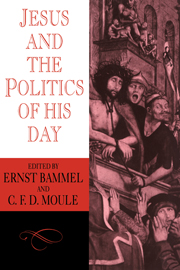Book contents
- Frontmatter
- Contents
- Abbreviations
- Foreword
- The Zealots and Jesus
- The revolution theory from Reimarus to Brandon
- The date and character of Mark
- Some observations on Tendenzkritik
- Argumentum e silentio
- The Poor and the Zealots
- The opposition between Jesus and Judaism
- Judaeo-Christianity and the Jewish establishment, A.D. 33–66
- A.D. 70 in Christian reflection
- The trial of Jesus in the Acta Pilati
- Christ as brigand in ancient anti-Christian polemic
- Jesus as a political agent in a version of the Josippon
- The Feeding of the Multitude
- The coin of ‘Render unto Caesar …’ (A note on some aspects of Mark 12: 13–17; Matt. 22: 15–22; Luke 20:20–26)
- Render to Caesar
- The Temple tax
- ‘Not peace but a sword’: Matt. 10:34ff; Luke 12: 51ff
- The decision of the Supreme Court to put Jesus to death (John 11:47–57) in its context: tradition and redaction in the Gospel of John
- The ‘triumphal’ entry
- The two swords (Luke 22: 35–38)
- The titulus
- Romans 13
- Biblical criticism criticised: with reference to the Markan report of Jesus's examination before the Sanhedrin
- The political charge against Jesus (Luke 23: 2)
- The trial before Pilate
- ‘His witness is true’: A test of the Johannine claim
- Index of Authors
- Index of References
A.D. 70 in Christian reflection
Published online by Cambridge University Press: 19 January 2010
- Frontmatter
- Contents
- Abbreviations
- Foreword
- The Zealots and Jesus
- The revolution theory from Reimarus to Brandon
- The date and character of Mark
- Some observations on Tendenzkritik
- Argumentum e silentio
- The Poor and the Zealots
- The opposition between Jesus and Judaism
- Judaeo-Christianity and the Jewish establishment, A.D. 33–66
- A.D. 70 in Christian reflection
- The trial of Jesus in the Acta Pilati
- Christ as brigand in ancient anti-Christian polemic
- Jesus as a political agent in a version of the Josippon
- The Feeding of the Multitude
- The coin of ‘Render unto Caesar …’ (A note on some aspects of Mark 12: 13–17; Matt. 22: 15–22; Luke 20:20–26)
- Render to Caesar
- The Temple tax
- ‘Not peace but a sword’: Matt. 10:34ff; Luke 12: 51ff
- The decision of the Supreme Court to put Jesus to death (John 11:47–57) in its context: tradition and redaction in the Gospel of John
- The ‘triumphal’ entry
- The two swords (Luke 22: 35–38)
- The titulus
- Romans 13
- Biblical criticism criticised: with reference to the Markan report of Jesus's examination before the Sanhedrin
- The political charge against Jesus (Luke 23: 2)
- The trial before Pilate
- ‘His witness is true’: A test of the Johannine claim
- Index of Authors
- Index of References
Summary
The capture of Jerusalem by Titus and the burning of the Temple seem, so far as we can judge from the literature of the succeeding century and a half, to have made a surprisingly small impact upon the Christian communities. It was only a comparatively short time after the rejection of the messiah and the persecution of his followers by the leaders of Judaism when the spiritual and civil centre of Judaism was spectacularly destroyed, and the Temple laid in ruins. We might expect Christian apologists to have exploited to the fullest extent the extraordinary opportunity offered to them by that shattering event to vindicate the church's claim to be the true Israel, the rightful heir to the promises and blessings of the covenant, and to declare God's judgement upon the ‘stiff-necked and uncircumcised in hearts and ears’ (Acts 7: 51) who had so stubbornly opposed that claim. No special prophetic insight would have been required for any Christian to see in that disaster the decisive revelation of God's condemnation of the enemies of Jesus and his reversal of their verdict. We might also expect the year 70 to mark a turning-point in the relationship between Jewish Christianity and Judaism and so too, perhaps, between Jewish and Gentile Christians.
Yet in fact the literature of the Christian movement contains relatively few allusions to the fall of Jerusalem. The New Testament passages which may allude to it are somewhat enigmatic.
- Type
- Chapter
- Information
- Jesus and the Politics of his Day , pp. 153 - 172Publisher: Cambridge University PressPrint publication year: 1984
- 2
- Cited by

